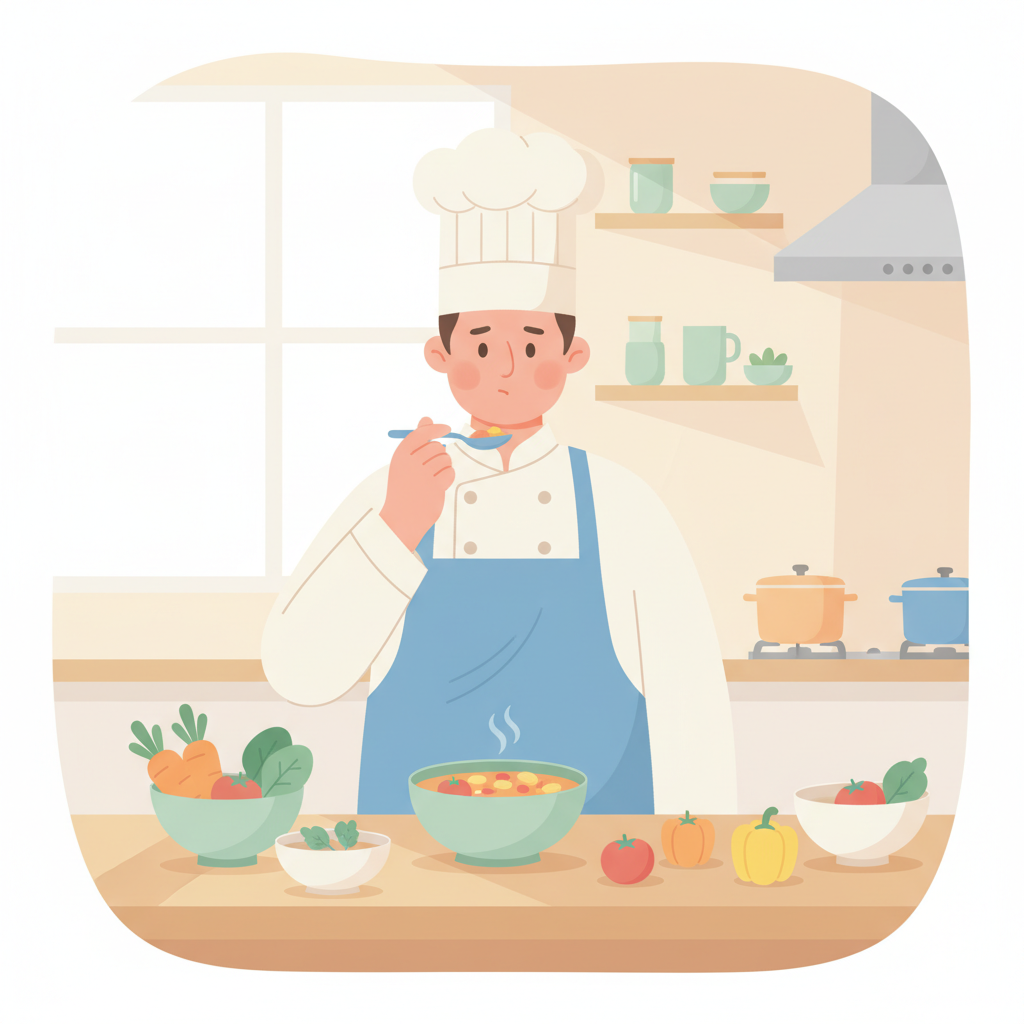As a chef, your sense of taste is your superpower. But keeping your palate sharp and accurate is a challenge, especially with long hours and diverse flavors.
Luckily, developing this skill is not just about innate talent—daily habits can enhance your tasting accuracy and make flavor identification more precise and reliable.
In this article, you’ll discover simple, research-backed habits that help chefs increase tasting accuracy, so you can cook with greater confidence and creativity.
Your 3 Daily Habits To Increase Tasting Accuracy
Habit 1 — Practice Frequent Mindful Tasting
Why: Increasing tasting accuracy means training your palate to notice subtle flavor differences during food preparation, not just at the end.
How: Taste your dish at every stage—when seasoning, adding acid, or testing texture—and use plain water or a cracker to reset your palate between tastings. Eat slowly and focus on the flavors and textures deliberately.
Cue: Before each key cooking step, set a timer or incorporate tasting into your mise en place routine.
Habit 2 — Build and Refresh a Flavor Library
Why: Familiarity with fundamental tastes and spices trains your sensory memory, helping you identify and adjust flavors quickly.
How: Regularly taste and smell key ingredients like salts, acids, herbs, spices, and fats. Try triangle tests by tasting similar but slightly different samples to refine your discrimination.
Cue: Dedicate 10 minutes weekly to practice with a curated set of reference ingredients.
Habit 3 — Care for Your Physical Health and Palate
Why: Hydration, restful sleep, and avoiding palate-degrading habits keep your sense of taste sharp and consistent.
How: Drink plenty of water throughout your day, get consistent sleep, and limit exposure to smoking, excess alcohol, and overly spicy or salty foods.
Cue: Set reminders to hydrate regularly and create a sleep schedule that supports your work life.
Week 1 Schedule
| Day | Focus Habit | Activity |
|---|---|---|
| Monday | Mindful Tasting | Taste each ingredient in your prep; reset palate with water and crackers between tastings |
| Tuesday | Flavor Library | Taste and smell a selection of reference spices and acids; note differences |
| Wednesday | Health Care | Focus on hydration and getting 7-8 hours of sleep |
| Thursday | Mindful Tasting | Practice triangle taste tests with samples of similar seasoning |
| Friday | Flavor Library | Smell and taste fresh herbs and spices; record observations |
| Saturday | Health Care | Avoid smoking, reduce alcohol; stay hydrated |
| Sunday | Review and Reflect | Review notes; plan for next week’s practice |
Troubleshooting
Barrier: Getting overwhelmed with too many flavors or losing sensitivity during long shifts.
Fix: Use palate resets with water or crackers routinely and focus on tasting smaller portions at a consistent temperature to maintain focus on each flavor.
Barrier: Forgetting to hydrate and manage sleep impacts your taste perception.
Fix: Set reminders on your phone to drink water and create a consistent bedtime routine to support your palate health.
Barrier: Habits like smoking or constant exposure to spicy or salty foods dull taste.
Fix: Gradually reduce these habits and incorporate palate-fast days with milder, balanced foods to resensitize taste buds.
FAQs
Q: How often should I taste food to improve my tasting accuracy?
A: Frequent tasting throughout each cooking phase helps build memory and calibration of flavors. Aim to taste small amounts at every key step.
Q: Can smoking affect my ability to taste food accurately?
A: While some chefs smoke, smoking can dull your palate intensity. For best tasting accuracy, limiting smoking is advised to keep your sense sharp.
Q: What is the role of smell in tasting accuracy?
A: Smell contributes about 90% of what we perceive as taste. Enhancing your olfactory skills by smelling ingredients improves overall flavor recognition.
Tracking & Motivation Tips
Keep a tasting journal where you record your observations about seasoning, acid levels, and textures during cooking. Over time, this practice helps transform subjective tastes into objective knowledge, boosting your increase tasting accuracy with consistency. Celebrate small improvements and goal milestones to stay motivated.
Key Takeaways For Increasing Tasting Accuracy
To increase tasting accuracy, chefs benefit from daily mindful tastings, regular practice with a flavor library, and maintaining good health habits to keep the palate sensitive. Consistency in these simple steps builds lasting improvements that make a big difference in cooking quality and confidence.
Join the Waitlist
Ready to put these habits into action? Dayspire helps you reach any goal with simple daily habits. Join the waitlist now to be the first to get invited to Dayspire!




